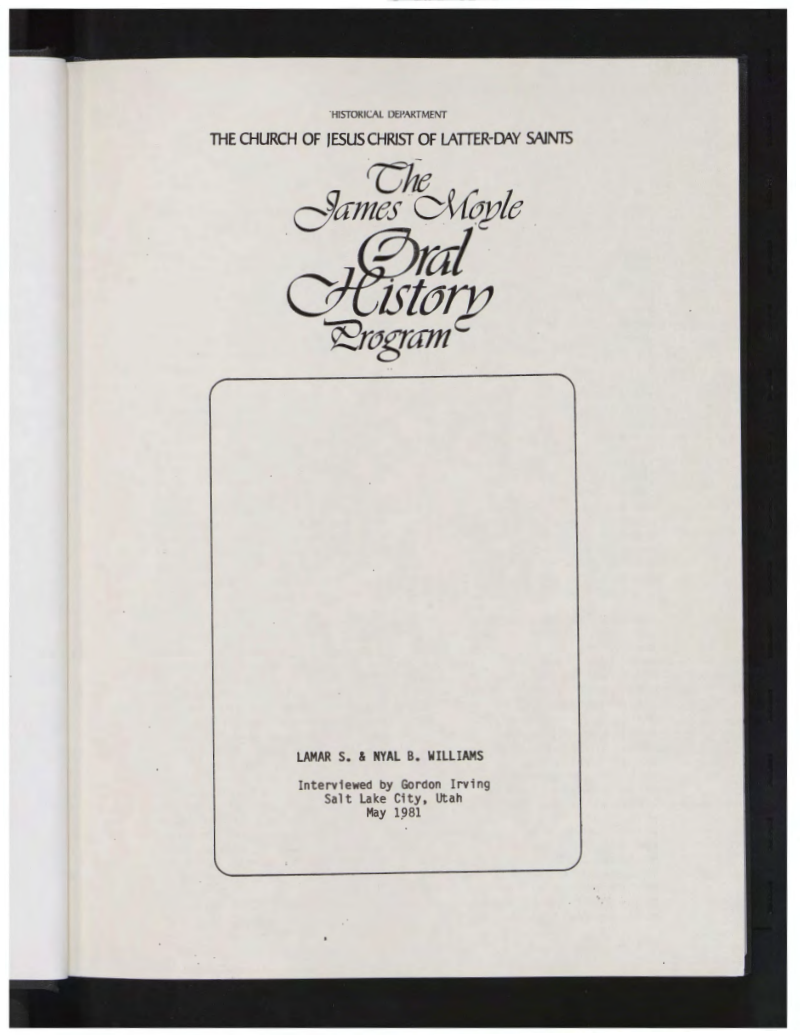Lamar S. Williams grateful that he was called back home from Nigeria before the Biafra War broke out.
- Type
- Book
- Hearsay
- Scribed Verbatim
- Reference
LaMar S. Williams and Nyal B. Williams Interview by Gordon Irving, May 6, 1981, 20-21, James Moyle Oral History Program, MS 200 692, Church History Library
- Scribe/Publisher
- Church History Library
- Audience
- Members of The Church of Jesus Christ of Latter-day Saints
- Transcription
W: On our last trip to Nigeria, in 1963, I made friends with the secretary of state in the eastern part of Nigeria, with headquarters at Enugu. He was desirous of having the Church come into his area. Elder Wright, a young missionary who was my companion, and I rode from the Uyo and Aba area up to Enugu in this man's private government car with him, with a chauffeur driving and with the flags and all on his car. He was determined to help us get our visas and to establish the Church in Nigeria. I, by chance, became acquainted with a barrister, who was something like an attorney general would be here,. who took care of the legal matters of the government, and he personally was helping us get our visas cleared.
At eleven o'clock on a Saturday morning in Enugu I received a telegram from the First Presidency instructing me to discontinue negotiations with the government and to return home immediately. By two o'clock we were on a plane headed for Lagos and for London.
I had received some clippings sent to me by my wife that three new counselors had been added to the First Presidency. When I got home, I was called into a meeting of the First Presidency with the five counselors to President McKay. During the conversation and interview I was not really informed as to why I'd been called back home or why they were discontinuing negotiating with the government. I wasn't quite able to discover it. The spokesman for the group was Thorpe B. Isaacson, who had been selected as one of the counselors to the First Presidency. He seemeq to be carrying on most of the conversation. President McKay remained almost silent, as did the other counselors, who only asked a few questions. Finally Brother Isaacson stated that we were just asking for. a lot of problems. I replied, "Since when did the Church start running away from problems?" He said, "There's no use asking for them."
Within a six-week period of time the Biafran War broke out, and the war was in the very area that I had been doing missionary work or trying to establish the Church. I would have been right in the center of that conflict had I remained. It wasn't until then that I felt that the Lord had something to do with getting me out of Nigeria. It wasn't the time for the Church to be established. I was on a plane traveling with President [Harold B.] Lee from Los Angeles when -he made this statement, "LaMar, it's just a matter of timing in establishing the Church." And he was right. The time was not right.
I: I've heard people say that many of the people who in '61 and '62 claimed to be affiliated with the Church were killed in the Biafran War. Is that true?
W: I don't know how many were killed, but one of the leaders of one of the large groups was shot and killed. And I have never been able to find Honesty John Ekong. I don't know what happened to him.
I: But it wasn't a situation where almost all of them were wiped out?
W: No.
I: But some were.
W: Some were. Some became involved.
I: Brother Isaacson's position that we could be asking for trouble, even without this war, seems to have some merit. It could have presented some real challenges to be working over there.
W: At that particular time, without the priesthood being given to these people and all of the opposition, it just wasn't the time.
- BHR Staff Commentary
Williams mistakenly recalled that the Biafra War broke out about six weeks after his meeting with the First Presidency. He was referring, no doubt, to the first of a series of military coups that took place on January 15, 1966. The period of unrest led to the outbreak of the Biafra War which took place sometime later, on July 6, 1967, not long after the Republic of Biafra declared its independence.
The B. H. Roberts Foundation is not owned by, operated by, or affiliated with the Church of Jesus Christ of Latter-day Saints.

